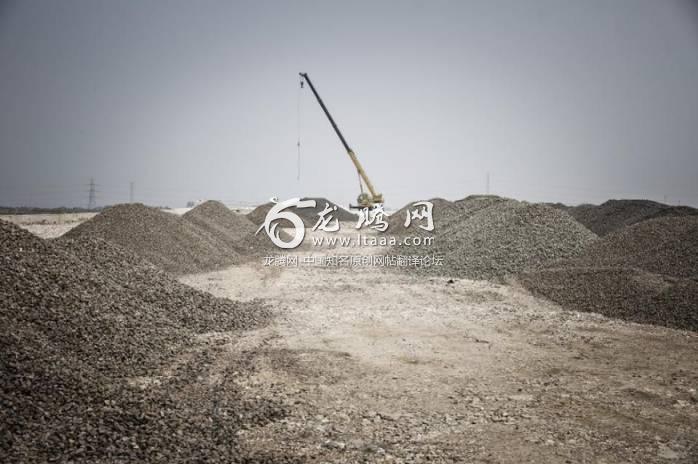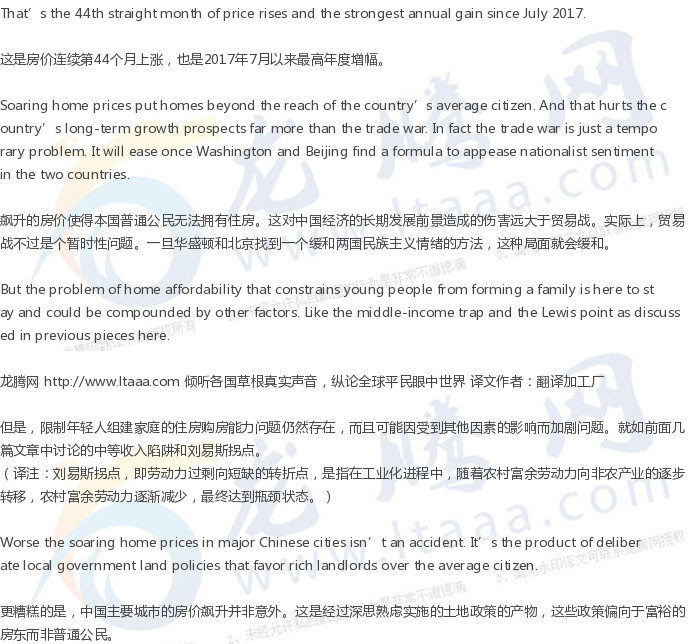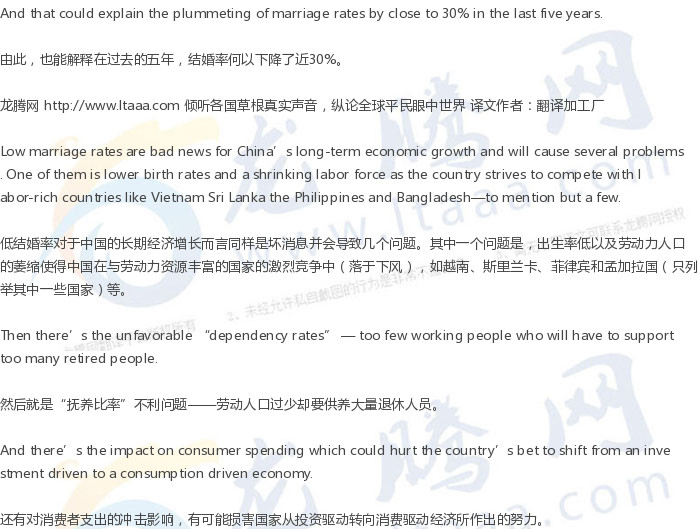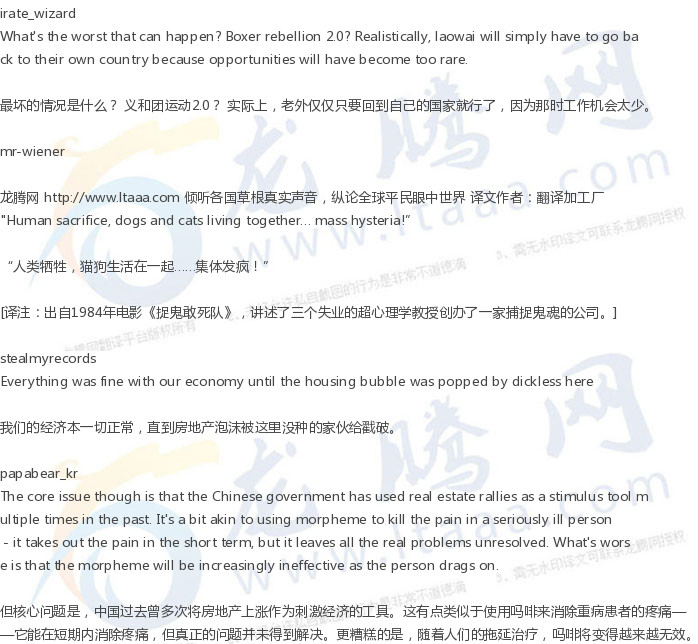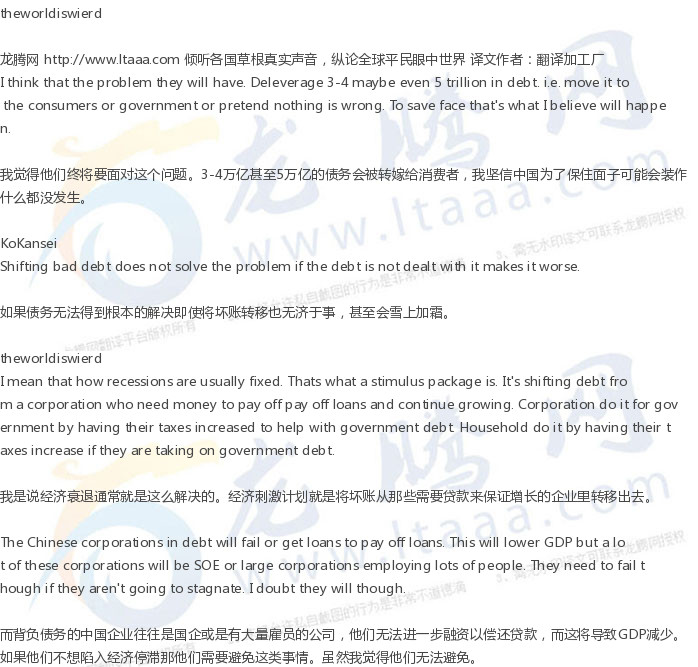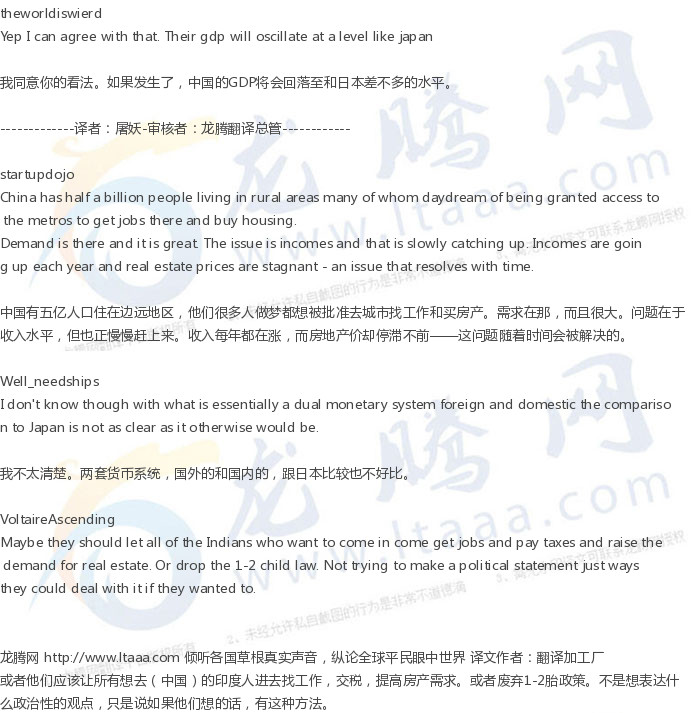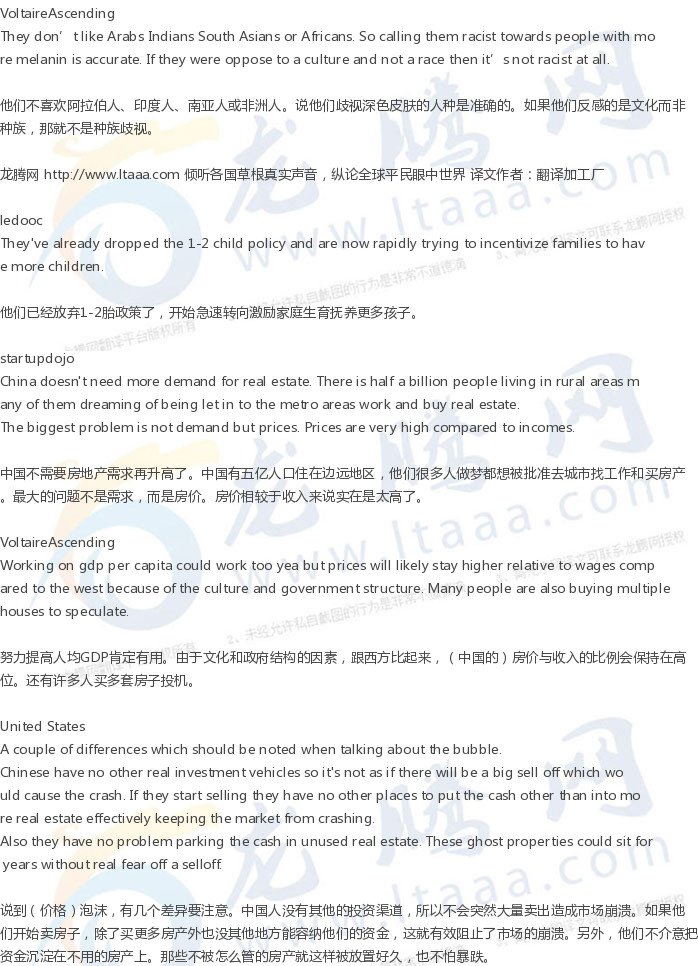中国的首要问题不是贸易战:而是国内的价格泡沫期;日本因此经济衰退三十年,中国则可能受损更持久 [美国媒体]
中国首要的长期问题不是最近主导社会媒体报道的贸易战,而是房地产泡沫——不断飙升的房价让房东们变得富有,同时也粉碎了年轻人组建家庭的梦想。
每人一小段,翻译我也行!
每日新素材,等你来认领! http://www.ltaaa.com/translation.html
-------------译者:srdz-审核者:龙腾翻译总管------------
China’s top long-term problem isn’t the trade war that dominates the social media recently. It’s a home bubble—the soaring home prices that makes landlords rich while it shatters young people’s dreams of forming a family.
中国首要的长期问题不是最近主导社会媒体报道的贸易战,而是房地产泡沫——不断飙升的房价让房东们变得富有,同时也粉碎了年轻人组建家庭的梦想。
Average prices of new homes in 70 Chinese cities climbed by 9.7% on an annual basis in December of 2018 up from a 9.3% in the previous month according to Tradingeconomics.com.
据全球经济指标数据网统计,2018年12月中国70个城市的新房平均价格同比上涨9.7%,高于上月的9.3%。
How? By creating scores of “ghost cities” -- cities filled with buildings with vacant apartments. “The mismatch between the cost of new homes and the content of the typical Chinese wallet is complete” writes Ruchir Sharma in BREAKOUT NATIONS: The Pursuit of the Next Economic Miracles.“ Developers are building “ghost cities—“ vast tracts of apartment high—rises and malls that remain largely vacant because the Chinese worker can’t afford them.”
如何做到的呢?通过制造大量“鬼城”——指到处都是空置公寓的城市。鲁奇尔·夏尔马(Ruchir Sharma)在《一炮走红的国家:探寻下一个经济奇迹》一书中如此写道,“新房子的价格与普通中国人的钱包形成了彻底的不协调。开发商在修建“鬼城”——大片高耸的住宅和购物广场大量空置,因为普通的中国劳动者买不起。”
-------------译者:碧天云外-审核者:龙腾翻译总管------------
Vacant apartments belong to wealthy landlords who expect to sell them one day at higher prices.
这些空置的公寓属于那些期待着有朝一日能将这些公寓高价售出的富裕地主。
Meanwhile holding apartments off the market fuels a huge housing shortage which pushes the prices for “second-hand” houses ever higher. Shanghai’s Second-Hand House Price Index for example has soared from under 1000 in 2003 to around 4000 in 2017.
同时,这些不能进入市场交易的公寓助长了房源短缺,并将二手房价推向新高。例如,上海的二手房房价指数就从2003年的不到1000疯涨到2017年的4000左右。
That’s bad news for young people looking for a home to shelter a family.
这对那些寻找住房想组建家庭的年轻人来说可是个坏消息。
Japan has already faced these problems and it’s counting three lost decades even after it settled its trade disputes with the US. China could count many more.
日本早已面临这些问题,且在与美国解决了贸易争端的前提下,日本仍处在第三个“失去的十年”时期。中国有可能面临更为持久的经济衰退。
(译注:失去的十年[日文:失われた10年、英文:The lost decade]指的是一个国家或地区陷入长期的经济不景气的状况持续达10年左右才逐渐转好的情况。)
-------------译者:pasimengte-审核者:龙腾翻译总管------------
KoKansei
Central bank aside, the Japanese had the advantage of an honest, relatively manipulation-free market which kept their property bubble from blowing up even further.
I don't know when or how the China property bubble will burst, but when it does the fallout will be felt around the world and if you are a laowai you do not want to be at ground zero when it does.
除了中央银行之外,日本还有一个优势,那就是拥有一个诚实、相对自由的市场,这使得他们的房地产泡沫不会进一步膨胀。我不知道中国房地产泡沫何时或会如何破裂,但当它破裂时,全世界都会感受到其影响,如果你是一个老外,你不会希望在它破裂时身处原爆点中。
diehard1972
So I guess the question is if correct (which I honestly doubt to the articles extent): Are there any tools that China has that Japan didn't? I know Japan was in some denial but beyond that, the complexity is beyond my payscale.
因此,我想问题是,如果(文章内容是)正确的(而我对此其实怀疑):中国有哪些日本没有的(经济)工具吗? 我知道日本在某种程度上对此拒不承认,但除此之外,这复杂性已超出了我的薪酬能力范围。
Well_needships
Yes, China has a nearly closed domestic monetary system. I'm not exactly sure how that will play out with the real estate bubble, but my guess is that if CCP works on a slow deflation of the bubble they could pull it off because domestically it would just mean cost of living (because of import prices) keep rising relative to property prices.
是的,中国有一个几乎封闭的国内货币体系。 我不确定这会对房地产泡沫产生什么影响,但我猜测,如果ZG致力于缓慢缩小泡沫,他们可能会成功(解决问题),因为在国内,这只意味着生活成本(因为进口价格)相对于房地产价格在持续上涨。
-------------译者:tonysb007-审核者:龙腾翻译总管------------
KoKansei
They will never let the SOEs fail. I would be pleasantly surprised if I'm wrong but I doubt even one of the major SOEs - which let's be honest at this point are basically giant welfare programs for otherwise unemployable pencil pushers - will be allowed to go bankrupt.
If history is any indication the bad debt will be shifted around until the RMB is completely debased and the zombie organizations will be propped up until there is an actual honest-to-god uprising.
他们决不允许国企破产。但我很肯定当某个主要国企需要承担巨额的失业人员的善后赔偿时,破产将被允许。如果说历史能提示些什么,那就是坏账会在人民币彻底贬值后得到转移,僵化的体制会在起义后被推翻。
theworldiswierd
Yeh seeing as SOE are worth 8 trillion USD in terms of assets and china economy is worth 12 trillion USD. You do the math on what would happen if they went away.
中国国有企业的资产价值为8万亿美元,而中国经济总量为12万亿美元。算算国企的经济比重,你可以想想当它们完蛋时会发生什么。
FangoFett
Never going to happen. 1) They’re too racist to let Indians in 2) The avg Chinese can barely afford to raise 1 child let alone more than 2.
门儿都没有。1)他们很种族主义,不会让印度人进去的。2)普通的中国人养一个孩子都难,更别说两个了。
VoltaireAscending
Well there are wealthy people who could have more if they wanted to. I know they’re pretty racists against people with more melanin but it’s just something that they could do. A lot of the us was racist but they let people in over time by just ignoring the border people aren’t as racist now I think proximity to people makes you more understanding and tolerant of them.
嘛,有钱人能生更多,只要他们想。我知道他们对深色皮肤的人存有歧视,但他们能那样做。很多美国人都种族歧视,但他们总是无视边界,放移民进来。人们现在没那么种族歧视了。跟移民接触更多让你更理解、更包容他们。
vaCew
Chinese being racist towards Indians has nothing to do with their skin color but with the difference and extreme contrast in culture. Chinese would not like Indians even if they where white (which some are). The same reason is why a majority of South east asians also dont like Indians as much.
中国人歧视印度人跟肤色无关,只是由于文化上的差异和极端对立罢了。哪怕是白皮肤的印度人(有些确实是白皮肤),中国人也不欢迎。理由跟大多数的东南亚人不喜欢印度人一样。
-------------译者:屠妖-审核者:龙腾翻译总管------------
Lastly a lot of the property here is unmortgaged. A big reason for property crashes in the past were mass defaults. That might not happen here again see point 2 they have no problem parking the cash and waiting for the market to adjust.
最后,这儿很多房产没有被抵押。过去房产市场崩溃一个很重大的原因是出现大规模违约。可这里不会发生这种事,第二点我就讲了,他们不介意让资金沉淀,等待市场调整。
Saying all that it seems impossible that something maybe something we can't even foresee right now won't bring about a crash. At the end of the day an asset priced way out of its value is unsustainable forever.
说了那么多,看起来根本不会有什么东西,或者我们现在无法预知的东西,会带来一场崩溃。最后,房产的价格是不可能永远定价过高的。
版权声明
我们致力于传递世界各地老百姓最真实、最直接、最详尽的对中国的看法
【版权与免责声明】如发现内容存在版权问题,烦请提供相关信息发邮件,
我们将及时沟通与处理。本站内容除非来源注明五毛网,否则均为网友转载,涉及言论、版权与本站无关。
本文仅代表作者观点,不代表本站立场。
本文来自网络,如有侵权及时联系本网站。
图文文章RECOMMEND
热门文章HOT NEWS
-
1
Why do most people who have a positive view of China have been to ...
- 2
- 3
- 4
- 5
- 6
- 7
- 8
- 9
- 10
推荐文章HOT NEWS
-
1
Why do most people who have a positive view of China have been to ...
- 2
- 3
- 4
- 5
- 6
- 7
- 8
- 9
- 10
